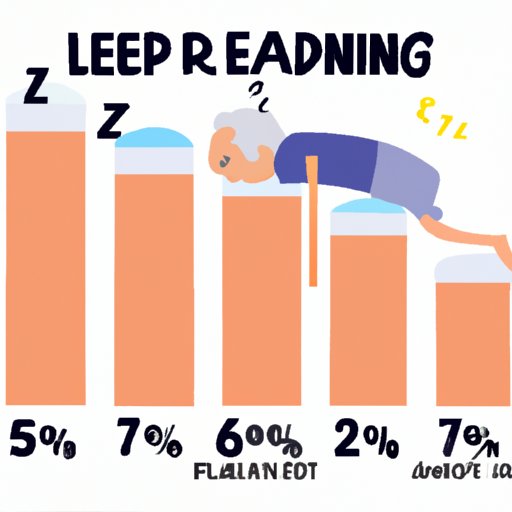Introduction
Sleep is a fundamental part of life. It’s essential for physical and mental health, as well as optimal performance in daily activities. But just how much time do we spend asleep? In this article, we’ll explore the impact of sleep on health and well-being, investigate the amount of time we spend snoozing, and evaluate the necessity of adequate sleep for optimal performance.

An Analysis of Sleep Habits and How Much Time We Spend Sleeping
To understand how much of our lives we spend sleeping, we must first examine average sleep times. Research suggests that adults need between seven and nine hours of sleep per night to function optimally, while children and adolescents require more—eight to 10 hours for school-aged children and up to 11 hours for teenagers.
There are many factors that can influence how long we sleep. These include age, work schedule, lifestyle habits, stress levels, and health conditions. For example, those who work night shifts may experience disrupted sleeping patterns, while people with insomnia may not be able to get enough sleep even when they try.
Examining the Impact of Sleep Deprivation on Health and Well-Being
Sleep deprivation is a serious issue that can have a major impact on physical and mental health. Chronic sleep loss can lead to fatigue, irritability, difficulty concentrating, mood changes, and increased risk of certain diseases.
Research has revealed that sleep deprivation can have significant physiological consequences as well. Lack of sleep has been linked to an increased risk of obesity, hypertension, and cardiovascular disease. Furthermore, studies suggest that inadequate sleep can weaken the immune system, making us more susceptible to illness.
Uncovering the Benefits of Healthy Sleep Patterns
Healthy sleep patterns are important for cognitive function and mental health. Studies show that getting enough sleep can improve memory and concentration, while lack of sleep can lead to poor decision-making and impaired judgment. Additionally, research suggests that good sleep hygiene is essential for managing stress and maintaining emotional wellbeing.
Exploring the Relationship Between Sleep Duration and Productivity
Sleep can also affect our productivity. Studies show that people who get enough sleep tend to perform better at work and school. They are also more likely to remember what they’ve learned. On the other hand, lack of sleep can impair concentration and decrease motivation, leading to lower productivity.
Investigating How Different Age Groups Spend Their Time Asleep
The amount of sleep needed varies depending on age. Infants typically need 16 to 17 hours of sleep each day, while children and adolescents require 9 to 10 hours. Adults, on the other hand, typically need 7 to 9 hours of sleep per night.
It is important to note that different age groups have specific sleep needs. For example, infants require frequent naps throughout the day, while teenagers may experience delayed sleep-wake cycles due to their changing hormones.

Looking at the Effects of Poor Sleeping Habits on Mental and Physical Health
Poor sleeping habits can have a negative impact on both mental and physical health. Insufficient or disrupted sleep can lead to fatigue, irritability, and mood changes. It can also increase the risk of developing certain chronic illnesses such as diabetes and heart disease.
Furthermore, poor sleep hygiene can worsen existing mental health conditions such as anxiety and depression. Finally, research suggests that people who get too little sleep are more likely to engage in unhealthy behaviors such as drinking alcohol or using drugs.

Evaluating the Necessity of Adequate Sleep for Optimal Performance
Adequate sleep is essential for optimal performance and overall health. Getting enough rest can help us stay alert and focused during the day, while lack of sleep can lead to poor performance at work or school. Additionally, research shows that insufficient sleep can have a negative impact on our physical and mental health.
Fortunately, there are strategies we can use to improve our sleep quality. These include establishing a regular bedtime routine, avoiding caffeine and alcohol late in the day, and limiting screen time before bed. Additionally, exercise and relaxation techniques can help us wind down before bedtime.
Conclusion
Sleep is a critical component of overall health and well-being. While the amount of time spent sleeping varies from person to person, most adults need between seven and nine hours of sleep per night. However, sleep deprivation can have serious consequences on physical and mental health, as well as productivity.
In order to achieve optimal performance, it is important to develop healthy sleep habits and get enough rest each night. This can help us stay alert and focused during the day, while improving our physical and mental health. By following these steps, we can ensure that we get the rest we need to live our best lives.


